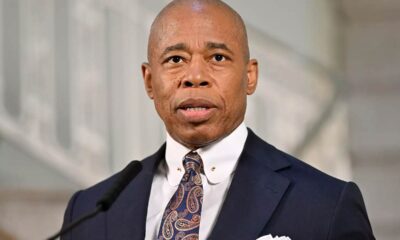Top Stories
A Crisis in Leadership at Medgar Evers College
“I was not brought here to lead a black institution. I was brought here to lead a public institution and to raise the bar.”
These are the words uttered by the current President of Medgar Evers College Dr. William Pollard at a meeting of the Medgar Evers College Community Council, and therein lies a fundamental problem as to why there is currently a “crisis in leadership.” Dr. Pollard is the leader of an institution named for the civil rights leader, Medgar Wiley Evers, a man whose life is symbolic of the struggle for the human and civil rights of black people in this country, a man who died tragically while advocating for the rights of black people who were disenfranchised. Medgar Wiley Evers, the man, symbolizes the mission of Medgar Evers College, a college whose mission is committed to providing students with a high-quality liberal arts education, ensuring that students have a knowledge of self, culture, history and preparing students to assume leadership roles and to serve their communities and the larger world.
Dr. Pollard does not understand that leading a black institution and raising the bar for a public institution are not mutually exclusive. He has not accepted the fact that he was asked to lead a predominantly black college whose students come from almost 70 different nations in the African Diaspora, including many countries in the Caribbean, Central and South America and West, East and Southern Africa, as well as other regions of the United States. He does not understand that the goals which framed the mission of Medgar Evers College are comparable to those goals which guided the development of Historically Black Colleges throughout our nation. Tragically and unfortunately, he seems frozen in time, in a generation that gave birth to a belief that quality, concern and excellence within black schools in African-American communities did not exist and that busing and the closing of such schools would result in a better education for black children. Our communities have sadly, experienced just the opposite. We have generations of students who have received an inadequate education in public schools despite the efforts of integration. And there is ample evidence that students who were educated in schools run by the African American community have received a sound education. One can both lead a black public institution and raise the bar. Educators like Pollard have not kept pace with this fact. .
Historically, the Black Church led to the birth of black colleges and through their leadership provided a unique education for black students. These institutions were created to serve students who were under-represented and who did not have access to higher education and entrance into majority institutions and graduate study opportunities. Historically Black Colleges speak to the value of empowering black students for success by creating and surrounding them with an educational and culturally rich, nurturing environment of faculty, staff and administrators. These colleges emphasize the importance of activism and service in a community of committed students, teachers and scholars.
Medgar Evers College does not have the formal classification of an Historically Black College, but it does have the classification of a predominantly black college. Educational institutions created after 1965, which currently have large numbers of blacks in their student body (over 75%), have been termed “predominantly black”. In fact, Medgar Evers College has received educational funds because of its classification as a predominantly black public institution.
Dr. Pollard’s lack of understanding of his role as a leader of a predominantly black college is most troubling and problematic. Many people want to be a leader but few understand the nature of leadership. A leader must have integrity, i.e., there must be evidence that the words of the leader match his actions. A leader must have problem-solving abilities so that problems which could have been addressed at early stages don’t spin out of control. Leaders have integrity and know how to influence people without promises of gifts and/or rewards. Leaders inspire followers who have confidence in them and who do not fear or intimidate them. One can have a title of a leader and still not be a leader. Leadership is earned not given. Those who do not understand this will not remain leaders for long.
Since assuming the leadership of Medgar Evers College, Dr. Pollard has engaged in a number of actions which reveal that there is a crisis in leadership at Medgar Evers College. Most recently, 89% of the faculty present at a meeting called to discuss a “vote of no confidence” affirmed a vote of no confidence in the leadership of Medgar Evers College and specifically in the Offices of President William Pollard and Provost Howard Johnson. There can be no “spin” of the facts by the Central Administration that can obscure or conceal the outright dissatisfaction of the majority of faculty and staff who have experienced the actions of this administration.
Dr. Pollard’s dismissal of this vote as reflective of a disgruntled group of faculty is evidence that he does not understand that he cannot lead an institution where 89% of a group of 66 faculty would affirm a vote of no confidence. He is not aware that within the last two years less than 35 faculty have voted in the Faculty Senate and that even fewer have come to the one Town Hall meeting called by the president. Thus, it is significant that twice as many faculty came to a meeting to declare their lack of confidence in the leadership of the current administration. A majority vote of 89% speaks volumes!
Dr. Pollard prides himself on wanting to create a student-centered environment. Yet under his leadership, the infrastructure for student and faculty support services has been dismantled. The Writing Center, which is dedicated to helping students throughout the College improve their writing, has been eliminated; the budget and services of the Learning Center, which provides tutoring for students in all disciplines, have been reduced; the staff and resources in the College’s library, computer and psych labs have been reduced; the Center for Teaching and Learning which supports improved pedagogy and faculty research and scholarship, has been eliminated and funding for faculty/student research has been blocked.
How can one speak of supporting a student-centered environment and dismantle the very structures that strengthen this support? When given the choice of expanding the Learning Center (the size of one classroom) or creating a game room, why would the president use precious space to create a game room? These actions that have dismantled student and faculty support services represent a lack of vision for what is academically in the students’ best interest and reveal a disjuncture between the words and actions of the President. In short, these actions speak to a lack of integrity in the leadership of Dr. Pollard.
Further evidence of the crisis in leadership is evidenced by the administration’s failure to adhere to shared governance procedures and policies. Colleges within the CUNY system operate by shared governance between administration, faculty, staff and students. The procedures which characterize this shared governance are described in the CUNY Bylaws, the College’s Governance Plan and the union’s Professional Staff Congress. Under the leadership of
Dr. Pollard, shared governance practices have been violated and there have been irregularities in conducting the business of college-wide committees and personnel actions. Duly elected chairs of departments have been removed; a clear example is the removal of the Education Department Chair whose students had 100% pass rates for the past three years on state teacher exams, and the replacement of the Chair with a faculty member who has no or little experience as a leader of a department and whose demeanor and temperament have put her at odds with students, faculty and educators at area schools.
Other violations of governance include the President’s refusal to chair the college’s personnel and budget committee, a committee which oversees the appointment, reappointment, promotion and tenure of faculty; the Provost’s refusal to disclose the votes of actions on college-wide committees; the unprofessional manner in which faculty have been informed of their non-reappointments (via security guards, in classrooms, in their offices and via the Internet.) The administration has also attempted to abolish and merge departments without going through the appropriate governance procedures involving faculty departments and the College Council. These actions are truly reflective of a crisis in leadership.
The most recent illustration of this leadership crisis is Dr. Pollard’s announcement of the formation of a criminal justice program which would be a collaboration between Medgar Evers College and the Brooklyn District Attorney’s Office. Prior to the announcement of this collaboration with District Attorney Hynes, President Pollard had expressed no interest in having a program involving formerly incarcerated individuals on campus; in fact he had expressed that he wanted no criminal elements on campus. However, when faced with widespread opposition to his treatment to this existing program (NuLeadership), he quickly courted DA Hynes (with as he indicated on a recent edition of Inside City Hall with the help of “a friend”) and engaged his office to deflect the criminal justice community’s outrage with his treatment of the Center for NuLeadership. Not surprisingly, Dr. Pollard has not been able to articulate what this criminal justice program would look like and the individual appointed at the College to lead this program has no experience working with formerly incarcerated individuals.
Why wouldn’t President Pollard call upon the expertise of the Center for NuLeadership on Urban Solutions, a center which has been at the College for the last six years and which has been dedicated to teaching and training formerly incarcerated students to create and deploy new and innovative paradigms for solving community development and related criminal justice challenges in communities of color?
Why would this announcement come after President Pollard issued an eviction notice for the Center for NuLeadership on Urban Solutions, a Center that is the only Center in this country founded and staffed by formerly incarcerated individuals, a Center that has been praised and recognized both locally and nationally as one of the premier public policy think tanks in the country on these issues?
The Center for NuLeadership has provided the College with a place where the study of mass incarceration, mass unemployment and mass disenfranchisement of Black men and women is conducted from the perspective of urban communities and people most impacted by these social phenomena. In view of President Pollard’s actions and statements related to The Center for NuLeadership, his launching of a new criminal justice program at Medgar Evers College for formerly incarcerated individuals lacks credibility.
In his book, The Servant as Leader, Robert K. Greenleaf reminds us:
“Foresight is the ‘lead’ that the leader has. Once he loses this lead and events start to force his hand, he is leader in name only. He is not leading; he is reacting to an immediate event and he probably will not long be a leader.”
The leadership at Medgar Evers College is in crisis. There is a breach of integrity and a lack of confidence in the leadership of the College under Dr. Pollard. The forming of the Medgar Evers College Coalition on Academic Excellence and Mission Integrity by faculty, students, community leaders and clergy and its expansion are evidence of the growing support for a change in leadership. Dr. Pollard’s lack of understanding of the nature of the College has affected his ability to lead the College and his image as an effective leader has unraveled.
The Medgar Evers College Coalition for Academic Excellence and Mission Integrity.
For further information visit www.MEfortheCommunity.org/ and
www.facebook.com/MEfortheCommunity or write to meccoalition@gmail.com.











